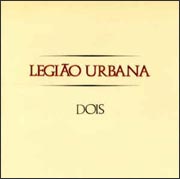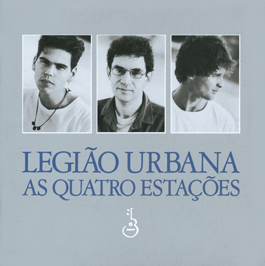
Legião Urbana was a Brazilian rock band formed in 1982 in Brasília, Distrito Federal. The band primarily consisted of Renato Russo, Dado Villa-Lobos (guitar) and Marcelo Bonfá (drums). In its earlier days, Legião Urbana also had a full-time bassist, Renato Rocha, but he left the band due to creative divergences.

Legião Urbana is the self-titled debut album by Brazilian rock band Legião Urbana. It was released on 1 January 1985.

Dois (transl. Two) is the second studio album by Brazilian rock band Legião Urbana. It was released in July 1986 and produced by Mayrton Bahia, which was at that time assigned by EMI-Odeon to produce the label's newcomers. The booklet has a picture of a couple hugging each other and photographed from behind; it was taken by Ico Ouro Preto, former guitarist turned-photographer of the band.

Que País É Este, subtitled 1978/1987, is the third studio album by Brazilian rock band Legião Urbana, released in 1987. The album booklet features a cartoon by drummer Marcelo Bonfá depicting the constant guitarist changes that the band went through until they hired Dado Villa-Lobos.

As Quatro Estações is the fourth studio album by the Brazilian rock band Legião Urbana. It was released on October 26, 1989. It is Legião Urbana's first release without bassist Renato Rocha, who was fired from the band prior to the album's recording sessions due to his lack of commitment to the group.
O Descobrimento do Brasil may refer to:
The Baader-Meinhof Group, also known as Red Army Faction, was a left-wing militant group active in West Germany from 1970 to 1998.

Uma Outra Estação is the eighth and final studio album by Brazilian rock band Legião Urbana. Released in July 1997, one year after Renato Russo's death, it sold over 250,000 copies and received a Platinum Certification by Pro-Música Brasil.
Soldado is a Spanish and Portuguese word meaning soldier. It may refer to:

Mais do Mesmo is the second compilation album by Brazilian rock band Legião Urbana. It was released in 1998, two years after vocalist, acoustic guitarist and keyboardist Renato Russo's death and the subsequent end of the band. All songs were extracted from all eight albums of the group, under Marcelo Bonfá's and Dado Villa-Lobos' choices. In Brazil, over a million copis were sold and the album was subsequently certified Diamond by ABPD.
"Tempo Perdido" may refer to:
"Eduardo e Mônica" is a song from Brazilian rock band Legião Urbana's 1986 album Dois, released as promo single. It tells a romantic story centered on a couple formed by the 16-year-old Eduardo and the older college student Mônica, who are very different from each other.
Caboclo means a person having copper-coloured skin in Brazilian Portuguese. Caboclo may also refer to
"Angra dos Reis" is a song written by Renato Russo, Renato Rocha and Marcelo Bonfá and released in 1987 on the album Que País É Este 1978/1987 by their band Legião Urbana. It was also released in 1988 as the second single off the album.
"Que País É Este" is a song by Brazilian rock band Legião Urbana. It was written by Renato Russo in 1978, when he was still a member of Aborto Elétrico. However, it was only released in 1987 on Legião Urbana's album Que País É Este.
This page is based on this
Wikipedia article Text is available under the
CC BY-SA 4.0 license; additional terms may apply.
Images, videos and audio are available under their respective licenses.





